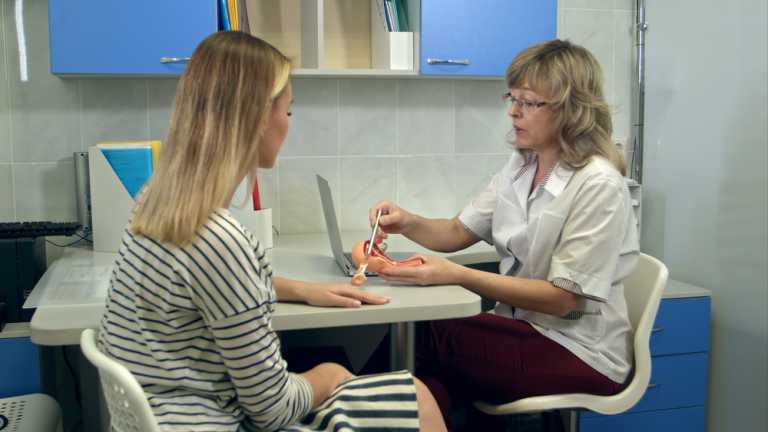At seven weeks pregnant, you’ll be hypervigilant for any changes or unexpected symptoms. So if you notice brown discharge when you wipe, it can trigger alarm bells.
Rest assured. You’re not alone. It’s incredibly common during the first trimester, and in most cases, it’s nothing to worry about. If the discharge is your only symptom, it’s most likely caused by your implantation bleed or the increased blood flow to your cervix.
Unfortunately though, brown discharge can occasionally be a sign of something more serious, especially if accompanied by pain.
Here’s everything you need to know about what’s normal, what’s not, and when to seek help.
What Does Brown Discharge in Early Pregnancy Mean?
Brown discharge is a mixture of cervical mucus and old blood. Fresh blood is bright red, but it oxidizes and turns brown as it ages. Often, it’ll resemble your normal discharge with a brown tint. But sometimes, it may have the consistency of coffee grounds.
Discovering that you’ve had some light bleeding in early pregnancy can be alarming. But it’s very common and not always a bad thing. Here’s what it could mean if you notice brown discharge at 7 weeks pregnant:
Implantation Bleeding
The most likely reason for brown discharge in early pregnancy is the leftover blood from your implantation bleed.
This is a small amount of spotting that happens when a fertilized egg attaches to the lining of your uterus. The movement irritates the blood vessels and causes bleeding.
It happens about 10 to 14 days after conception, around the same time as your missed period. But, unlike with your period, you won’t bleed enough to need a tampon or pad and will usually only notice it when you wipe.
Implantation bleeds only last between a few hours and 3 days, so it won’t be responsible for new blood at 7 weeks. But a small amount can hang around, mix with your vaginal discharge (leukorrhea), and become visible when you wipe.
Cervical Irritation or Trauma
Pregnancy hormones increase the blood flow to your cervix, making it more sensitive. This can cause it to bleed after activities like:
- Sexual intercourse
- Intense exercise
- Internal vaginal exams
Again, this won’t be enough to fill a tampon or pad. But the blood will oxidize, mix with your cervical mucus, and appear as pink or brown discharge.
Happily, this type of bleeding is normal and poses no risk to your child.
Cervical Polyps
Cervical polyps are irregular growths in the cervical canal that affect between 2 and 5% of women. In most cases, they’re small and benign. However, they are prone to irritation and can cause bleeding and brown spotting.
If you have cervical polyps, you’ll need to contact your doctor for a diagnosis. Depending on the polyp size and location, they can advise whether to remove them or leave them alone.
Possible pregnancy complications include excessive bleeding and preterm labor.
Ectopic Pregnancy
An ectopic pregnancy occurs when the fertilized egg implants anywhere outside the uterus, usually in a fallopian tube. As the embryo grows, it puts pressure on the tube. This can lead to rupture and life-threatening internal bleeding.
Symptoms to look out for include:
- Abnormal vaginal bleeding
- Pain in the abdomen or pelvis
- Cramping on one side
- Weakness or dizziness
- Back pain
- Shoulder pain
Fortunately, ectopic pregnancies are rare, occurring in only around 2% of pregnancies. However, as they’re so serious, you should see your doctor urgently if you experience any of the symptoms.
Infections
An infection of the cervix or vagina is usually called pelvic inflammatory disease, or PID. It can be caused by several conditions, such as:
- Bacterial vaginosis
- Chlamydia
- Gonorrhea
Often, these are accompanied by symptoms like:
- An unpleasant or fishy odor
- Discomfort or pain during sex
- Painful urination
- Pelvic pain
- Brown discharge
- Nausea
Unfortunately, pregnancy does not protect against STIs. So picking up an infection during pregnancy is perfectly possible. Fortunately, they are easy to diagnose with an examination or blood test. Then, most can be treated with oral medications like antibiotics.
You should see a doctor if you suspect an STI is causing your discharge. Some can cause complications, and many can be passed on to your baby during birth.
Subchorionic Hematoma
A subchorionic hematoma is a blood clot that forms between the placenta and the uterine wall. The symptoms include spotting or bleeding, which can result in brown discharge.
Fortunately, they are rare, only occurring in around 1.7% of pregnancies. Small ones don’t usually require treatment. But, large hematomas, or ones that are growing, can cause placental abruption or pregnancy loss.
Miscarriage
Unfortunately, brown discharge can also be a symptom of an early miscarriage. However, light spotting is incredibly common during the first trimester. So many health care providers won’t be concerned unless you have other symptoms like:
- Bright red bleeding
- Passing clots or tissue
- A loss of clear or pink fluid from your vagina
- Pain and severe cramps
- Loss of pregnancy symptoms
What Should You Do if You Have Brown Discharge at 7 Weeks?
If you notice some brown discharge when you wipe, don’t worry. Here’s what to do:
- Use panty liners to protect your underwear and make it easier to track changes.
- Make a note of the first time you noticed the discharge.
- Do a quick body scan for other symptoms. For example, do you have any pain or cramping?
- Contact your doctor or midwife with your symptoms and ask for their advice.
- Keep tracking your symptoms. Most spotting subsides within 3 days.
- If the discharge lasts more than a few weeks, becomes much darker, or the color turns red, contact your healthcare provider again.
- If there’s an issue, you may need an exam, an ultrasound, blood tests, bed rest, or medication.
Important – You don’t need to go to the emergency room for brown discharge unless you have any of the concerning symptoms listed below.
When Should You Worry About Brown Discharge in the First Trimester?
Although brown discharge in early pregnancy can be a cause for concern, it’s usually nothing to worry about.
Your healthcare provider will want to be informed. But, in most cases, they won’t want to see you unless you are also experiencing some of the following symptoms:
- Bright red bleeding
- Passing clots, tissue, or clear fluid
- An unpleasant odor coming from your vagina
- Severe abdominal cramping or pain
- Shoulder pain
- Backache
- Itchiness
- Fever
- Feeling faint or dizzy
- Pain during urination or sex
Remember – If you experience any worrying signs in early pregnancy, it’s OK to contact your doctors. Your and your baby’s safety is their number one priority.
They’ll be happy to answer your questions and give you the information you need to help put your mind at ease.





Hello I m almost 7 weeks pregnant, the day I discovered my pregnancy I had some pinky fluids coming down , later on the day the stopped. Doctors made some blood exams at hormone levels and they say that they came back satisfactory. After a couple of days I had some bleeding with clots coming out. I had an internal scan made and they found a hematoma. Everything they said look normal and they booked me in two week later scan. Same night I passed a big clot and since then only some spotting . I can see only brown fluid on wiping, I don’t have any pain. How can I know if everything is alright and that the clot that I passed wasn’t the baby ? Totally scared of miscarriages. Thank you in advance